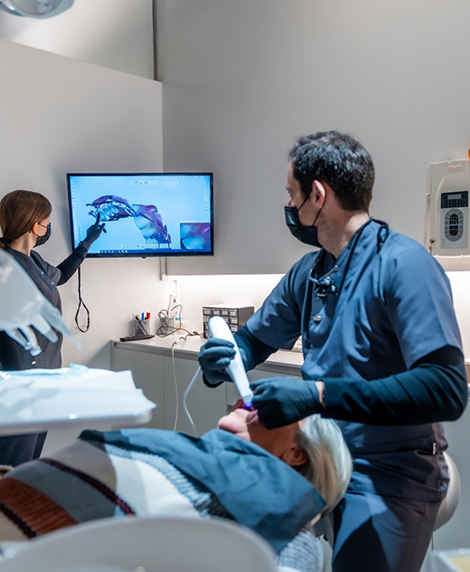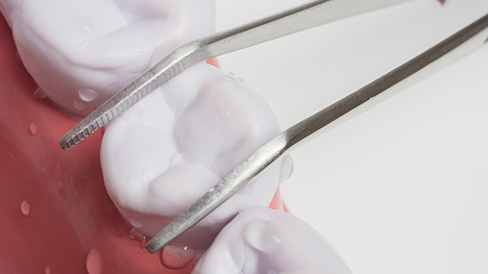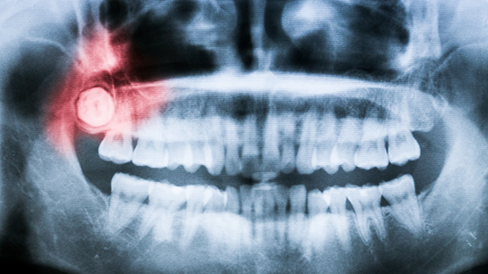Oral Surgery Coral Springs
Get All of Your Oral Needs Taken Care of in Our Office

When you visit Iglesias Dental Group for treatment, you don’t have to worry about any outside referrals to an oral surgeon if you need a minor procedure. We can perform common oral surgeries from the comfort of our state-of-the-art Coral Springs dental office where you already feel at home.
Why Choose Iglesias Dental Group for Oral Surgery?
- Conscious Sedation Available
- Start-to-Finish Implant Process Under One Roof
- Team of Experienced Dentists & Periodontal Specialist
Common Reasons for Oral Surgery

Some of the most common oral surgeries we perform in our Coral Springs dental office include the following:
- Extractions for wisdom and dead teeth, or to alleviate crowding
- Dental implant placement
- Root canal therapy
- Gingivectomies
- Frenectomy
- Gum Graft
No matter what oral surgery you require, there are a few things you can keep in mind to ensure you enjoy a smooth operation and speedy recovery.
- Wear comfortable clothes to your procedure, and refrain from wearing jewelry or other accessories to this appointment (don’t worry, we think you look great no matter what).
- Plan for someone to drive you to and from your operation.
- Prepare for the coming days beforehand by stocking your kitchen with nutritious, easy-to-eat foods like soup, yogurt, oatmeal or soft fruits.
-
Your dentist will advise you on any other tips related to your specific operation.
Reasons Why Tooth Extractions Are Necessary

Some of the reasons why we may suggest extracting a tooth include:
- Severe dental decay that can’t be treated with a filling.
- A tooth treated with a root canal didn’t get rid of the infection.
- A tooth has been severely damaged due to trauma.
- Gum disease has caused recession that has resulted in a permanent tooth becoming loose.
- Your mouth is overcrowded, keeping you from getting ideal results from orthodontic treatment.
- Wisdom teeth pose a threat to your oral health.
In many cases, our team will highly recommend getting a tooth replacement sooner rather than later after they’ve undergone an extraction, that way they can avoid the complications that often come with tooth loss.
The Process of Removing a Tooth

The tooth extraction procedure is typically straightforward. For a simple or regular removal, our team will simply begin by administering a local anesthetic to completely numb the area we’ll be working around. This means you shouldn’t expect any pain during your procedure, other than some mild pressure. We might even provide sedation dentistry for optimal relaxation.
After verifying that you’re safe and comfortable, we’ll use an instrument known as an elevator that is designed to lift the tooth out of the socket. Then, your dentist will clasp the tooth with special forceps and carefully rock it side to side until it breaks away from the ligaments holding it in position. Finally, we’ll place clean gauze in your mouth to control any bleeding. Of course, you’ll be provided with at-home aftercare instructions and we’ll develop a treatment plan for a tooth replacement during your follow-up appointments.
Tooth Extraction Aftercare

Our team will give you specific aftercare guidelines before and after your treatment that will help you recover in the most efficient way possible. These instructions typically involve:
- Taking prescribed/over-the-counter pain relievers to minimize discomfort
- Keeping your head elevated, even during rest, to reduce blood flow to the surgical site
- Waiting 24 hours after your surgery before rinsing your mouth with warm salt water
- Eating softer foods until you’ve healed completely
- Avoiding using a straw, drinking alcohol, or smoking
- Refraining from strenuous exercise
-
Planning to replace the missing tooth to avoid issues with tooth loss, such as dental shifting, jawbone deterioration, or further tooth loss
When Is Wisdom Tooth Extraction Really Necessary?

Just because you have wisdom teeth doesn’t mean they need to be removed. Typically, we only suggest extracting them in these situations:
- You’re experiencing severe pain as they grow in.
- The sacs that your wisdom teeth grow in develop into cysts that can burst and damage your jawbone.
- An increased risk of gum disease and cavities.
- There’s not enough room for your wisdom teeth in your jawbone, causing orthodontic issues if you allow them to erupt.
- They’re stuck below your gumline and could become infected.
If you’re experiencing discomfort and aren’t sure whether you need your wisdom teeth removed, contact our office today.
I Need a Checkup & Cleaning I Need a Dentist for My Child I Have a Cavity or Broken Tooth I am Missing One or More Teeth I Want to Enhance My Smile I Have a Dental Emergency I am Worried About Gum Disease I Have Jaw Pain/Headaches I Am Afraid of the Dentist I Snore/Have Sleep Apnea View Our Services
